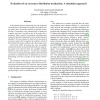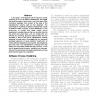164 search results - page 23 / 33 » Using software evolution history to facilitate development a... |
120
Voted
WETICE
2005
IEEE
15 years 7 months ago
2005
IEEE
In distributed software engineering, the role of informal communication is frequently overlooked. Participants simply employ their own ad-hoc methods of informal communication. Co...
129
click to vote
COMPSAC
2008
IEEE
15 years 8 months ago
2008
IEEE
— In software testing and maintenance activities, the observed faults and bugs are reported in bug report managing systems (BRMS) for further analysis and repair. According to th...
130
click to vote
AOSD
2008
ACM
15 years 3 months ago
2008
ACM
Aspect-oriented programming languages provide new composition mechanisms for improving the modularity of crosscutting concerns. Implementations of such language support use advanc...
112
click to vote
IWSSD
1993
IEEE
15 years 6 months ago
1993
IEEE
In this paper, we propose the use of fine-grain process modelling as an aid to software development. We suggest the use of two levels of granularity, one at the level of the indiv...
IWPC
2000
IEEE
15 years 6 months ago
2000
IEEE
We combine type inference and concept analysis in order to gain insight into legacy software systems. Type inference for COBOL yields the types for variables and program parameter...


